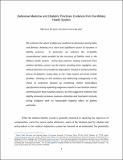Defensive Medicine and Obstetric Practices: Evidence from the Military Health System
Author(s)
Frakes, Michael; Gruber, Jonathan
DownloadGruber_Defensive_medicine_obstetric_practices.pdf (609.3Kb)
Open Access Policy
Open Access Policy
Creative Commons Attribution-Noncommercial-Share Alike
Terms of use
Metadata
Show full item recordAbstract
We estimate the extent of defensive medicine by physicians during labor and delivery, drawing on a novel and significant source of variation in liability pressure. In particular, we embrace the no-liability counterfactual made possible by the structure of liability rules in the Military Heath System. Active-duty patients seeking treatment from military facilities cannot sue for harms resulting from negligent care, while protections are provided to dependents treated at military facilities and to all patients—active-duty or not—who receive care from civilian facilities. Drawing on this variation and addressing endogeneity in the choice of treatment location by estimating mother fixed effects specifications and by exploiting exogenous shocks to care location choices stemming from base-hospital closures, we find suggestive evidence that liability immunity increases cesarean utilization and treatment intensity during childbirth, with no measurable negative effect on patient outcomes.
Date issued
2020-01Department
Massachusetts Institute of Technology. Department of EconomicsJournal
Journal of Empirical Legal Studies
Publisher
Wiley
Citation
Frakes, Michael and Jonathan Gruber. "Defensive Medicine and Obstetric Practices: Evidence from the Military Health System." Journal of Empirical Legal Studies 17, 1 (March 2020): 4-37. © 2020 Cornell Law School and Wiley Periodicals, Inc
Version: Author's final manuscript
ISSN
1740-1453
1740-1461